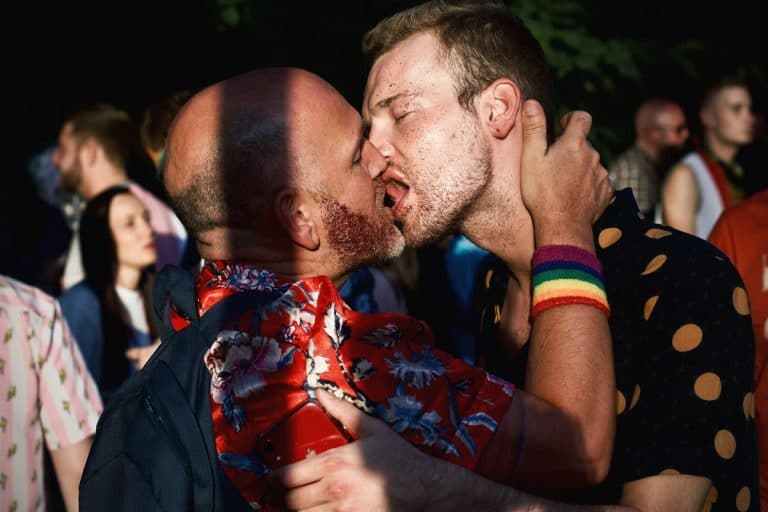How the LGBTQ+ community is reclaiming the Proud Boys hashtag

The first US presidential debate between Joe Biden and Donald Trump took place on 29 September, and Trump was given the opportunity to publicly condemn right-wing violence and white supremacists. However, in the president’s usual defensive attitude, he instead attacked left-wing activists and told an alt-right, anti-immigrant group called the Proud Boys to “stand back and stand by.”
Using the power of social media to divert the attention from the controversial group, the LGBTQ+ community has reclaimed #ProudBoys on Twitter by posting and tagging photos of LGBTQ+ love as a way to overshadow the movement’s extensive history of violence against left-wing and anti-fascist protesters. What is Proud Boys now, and what was it before last week?
Who are the Proud Boys?
Founded in 2016 by Canadian-British right-wing activist and VICE co-founder Gavin McInnes, the Proud Boys became a far-right, anti-immigrant, all-male group with an extensive history of street violence against its left-wing opponents. McInnes was eventually pushed out of VICE in 2008 and began distancing himself from the group in 2017, saying he’s not a part of the alt-right because his focus isn’t race, but “western values.”
The group’s name was created in reference to a song from the musical version of the Disney film Aladdin called ‘Proud of Your Boy’. Stereotypically, members of the group often wear black and yellow Fred Perry polo shirts with red Make America Great Again hats. These far-right Proud Boys define themselves as a “western chauvinist who refuses to apologise for creating the modern world.”
Their movement follows Trumpian ideas such as “glorify the entrepreneur,” “close the border,” “give everyone a gun,” “end welfare,” and “venerate the housewife.” Basically, an extreme chauvinism that stands against any form of equality.
Who are the Proud Boys now?
Technically, the Proud Boys name is still held by the right-wing activist group, however, thanks to online communities that support the fact that love is love and the grander scheme that the concept stands for, a whole new kind of #ProudBoys are reclaiming the name’s meaning by replacing what used to be dedicated to ideas engaged in misogyny, homophobia, racism and violence, with messages of love and positivity.
The campaign is believed to have taken flight thanks to a push from actor George Takei who tweeted the idea on 1 October by saying: “What if gay guys took pictures of themselves making out with each other or doing very gay things, then tagged themselves with #ProudBoys. I bet it would mess them up real bad. #ReclaimingMyShine.”
I wonder if the BTS and TikTok kids can help LGBTs with this. What if gay guys took pictures of themselves making out with each other or doing very gay things, then tagged themselves with #ProudBoys. I bet it would mess them up real bad. #ReclaimingMyShine
— George Takei (@GeorgeTakei) October 1, 2020
Takei even tweeted his own love story, and the LGBTQ+ community has since come together from all over the world to share and celebrate other love stories. Takei continued on Twitter saying “We’re proud of all of the gay folks who have stepped up to reclaim our pride in this campaign.”
In a week full of negativity, doubt, and frustration, this hashtag take over is so perfect. ❤️ https://t.co/8tT68eW5ZE
— Mark van Oppen (@MarkvanOppen) October 5, 2020
Matt Dechaine, one of the men who supported #ProudBoys by posting photos of himself and his husband told CNN that his goal was simply to spread joy. “It feels like the movement for positive change for all is gathering momentum all the time and I’m glad to be a small part of it. By coming together rooted in respect and love for each other, the world can be so much better!”
#ProudBoys, we support you. Trump, stand back.




